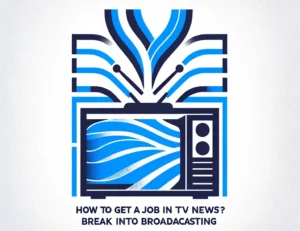Diving headfirst into the world of broadcast journalism sounds like an adventure, doesn’t it? The rapid pace, breaking news, and the potential to make a real difference – it’s no wonder you’re intrigued. But let’s be real: every rose has its thorn, and it’s crucial to look before you leap.
This post promises to give you an honest look at the broadcast journalism career – the good, the bad, and everything in between. So, buckle up; we’re about to get into the nitty-gritty.
Quick Takeaways:
- A degree in journalism and proficiency in technical skills like video editing are foundational for a career in broadcast journalism.
- Internships and a compelling portfolio showcasing your work and process are critical for breaking into the industry.
- Adaptability, communication skills, and a passion for storytelling are essential to thrive amidst the challenges and long hours.
What Does a Career in Broadcast Journalism Entail?
Exploring a career in broadcast journalism? Let’s peel back the curtain to reveal what this path really involves. At its core, broadcast journalism is about storytelling and informing the public through various media outlets, including television, radio, and digital platforms. Journalists in this field wear many hats – from reporters who gather and present news, anchors who host programs and deliver news segments, to producers who organize and oversee the creation of content.
Day-to-day responsibilities can range from researching story ideas, interviewing sources, writing scripts, to operating cameras, and even editing video or sound clips. With the evolution of digital media, many broadcast journalists now also manage social media channels and create content for online platforms. The variety in roles means there’s likely a niche for every interest, whether it’s politics, sports, entertainment, or investigative journalism.
Is It Really as Glamorous as It Sounds?
Sure, the idea of being on TV or radio has its allure, but broadcast journalism is more grit than glamour. The reality? It’s a blend of excitement and hard work. The rush of breaking a news story first or interviewing high-profile personalities comes with its own set of challenges.
Long, unpredictable hours are the norm, often including weekends, holidays, or overnight shifts to meet the insatiable 24/7 news cycle. Deadlines are tight, and the pressure is on to deliver accurate, compelling news stories ahead of the competition. This job is not just about being camera-ready but also about the relentless pursuit of truth and keeping the public informed.
What Are the Potential Downsides?
Before diving into a career in broadcast journalism, it’s crucial to look at the full picture, including the challenges you might face:
-
Job Instability: The media landscape is changing rapidly, making the field highly competitive and sometimes leading to job insecurity. Traditional outlets are downsizing, while digital platforms grow, altering the demand for certain roles.
-
Impact of Digital Media: The explosion of digital and social media has created a double-edged sword. While it opens new opportunities for storytelling and audience engagement, it also requires journalists to be tech-savvy and versatile, often stretching thin resources and time.
-
Emotional Toll: Covering natural disasters, accidents, crimes, or other traumatic events can take a significant emotional toll on journalists. Being constantly exposed to the harsh realities of the world can lead to stress, burnout, or even vicarious trauma.
Here’s a nugget most overlook: In the era of evolving media consumption habits, broadcast journalists now have the unique opportunity to become multifaceted digital storytellers. Those who adapt by developing skills in digital content creation, SEO, and analytics, find themselves at a distinct advantage. For instance, learning to analyze viewer data to tailor content can greatly enhance audience engagement and open new career pathways within digital journalism.
As broadcast journalism continues to evolve, so does its definition of success. While challenges exist, the potential for impact and fulfillment in this dynamic field remains significant.
What Skills and Qualifications Do I Need?
Stepping into the world of broadcast journalism is akin to preparing for a marathon. It requires not just stamina but a unique set of skills and qualifications that will set you apart from the competition. But fret not! I’m here to break it down for you in a way that’s both digestible and actionable.
First off, a degree in journalism or a related field is often considered the cornerstone of your career in broadcast journalism. This isn’t just about ticking a box; it’s about immersing yourself in the critical theories, ethical considerations, and hands-on training that will form the foundation of your career. Institutions like the Columbia School of Journalism offer not just degrees but a deep dive into the essence of journalism.
However, the realm of broadcast journalism demands more than just a solid educational background. Technical skills are the bread and butter of this career. We’re talking about proficiency in video editing software like Adobe Premiere Pro, understanding camera operation, lighting, and sound recording. In a world that’s increasingly digital, these skills will ensure your stories not only get told but captivate your audience.
But let’s not forget the soft skills. Communication, adaptability, and an undeniable curiosity about the world are what make broadcast journalists stand out. Your ability to communicate complex ideas in simple, relatable terms can turn a good story into a great one. Moreover, journalism is unpredictable. The ability to adapt to changing situations and deadlines with grace and professionalism is what will make you invaluable in any newsroom.
How Can I Get My Foot in the Door?
Alright, you’ve got the skills, the drive, and you’re chomping at the bit to get started. Breaking into broadcast journalism can seem daunting, but here’s your game plan for turning your dream into reality.
First and foremost, internships are your golden ticket. They provide invaluable real-world experience and an opportunity to build professional relationships. Platforms like Internships.com can be a great place to start looking. Remember, it’s not just about getting coffee; it’s about showing initiative, soaking up everything like a sponge, and making yourself indispensable.
Next, you’ll want to build a compelling portfolio. This is where you showcase your best work, but with a twist. Don’t just include your finished pieces. Consider adding a section on your process, challenges you overcame, and how you adapted to feedback. This provides a more comprehensive view of your skills and work ethic. Platforms like WordPress or Wix offer user-friendly options to get your portfolio up and running.
Now, here’s the unique tip most folks overlook: start a niche-related podcast or YouTube channel. With today’s technology, anyone can become a content creator. Having a specialized podcast or video channel can demonstrate your passion, knowledge, and skills in a way that traditional portfolios can’t. It’s a tangible way to show potential employers that you’re proactive about storytelling and savvy with multimedia platforms.
Finally, networking is not just a buzzword; it’s a crucial step in your journey. Attend industry events, workshops, and seminars. The connections you make can open doors to opportunities that aren’t advertised. Use LinkedIn to connect with industry professionals, but remember, it’s about building genuine relationships, not just collecting contacts.
Conclusion
Breaking into broadcast journalism is no small feat, but armed with the right skills, qualifications, and strategies, it’s a deeply rewarding career path. Remember, every great journalist started somewhere, and with perseverance and passion, you’ll carve out your own space in the broadcast world. Keep pushing, keep learning, and who knows? You might just become the voice that shapes the future.









